Before the largest crowd of his campaign, Democratic presidential contender Barack Obama on Thursday summoned Europeans and Americans together to "defeat terror and dry up the well of extremism that supports it" as surely as they conquered communism a generation ago.
"The walls between old allies on either side of the Atlantic cannot stand," Obama said, speaking not far from where the Berlin Wall once divided the city.
"The walls between the countries with the most and those with the least cannot stand. The walls between races and tribes, natives and immigrants, Christian and Muslim and Jew cannot stand," he said.
Obama said he was speaking as a citizen, not as a president, but the evening was awash in politics. His remarks inevitably invited comparison to historic speeches in the same city by Presidents John F. Kennedy and Ronald Reagan, and he borrowed rhetoric from his own appeals to campaign audiences in the likes of Berlin, N.H., when he addressed a crowd in one of the great cities of Europe.
"People of Berlin, people of the world, this is our moment. This is our time," he said.
Watch video -- full speech transcript and photos are below:
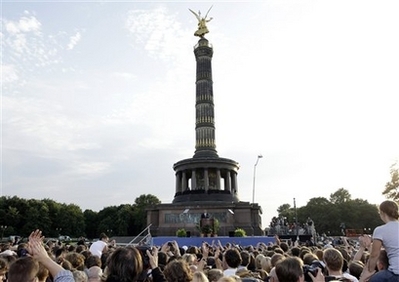
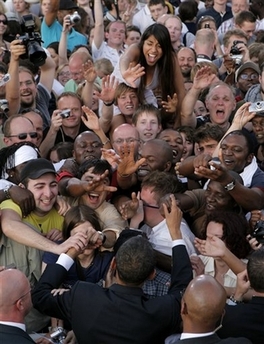
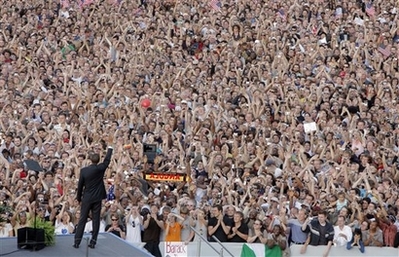
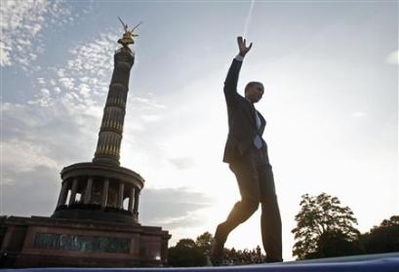
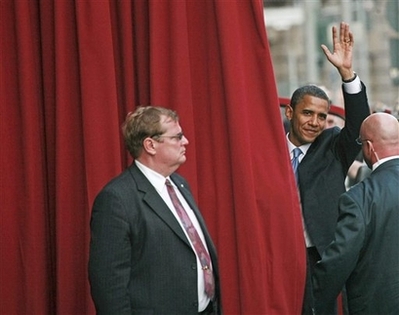
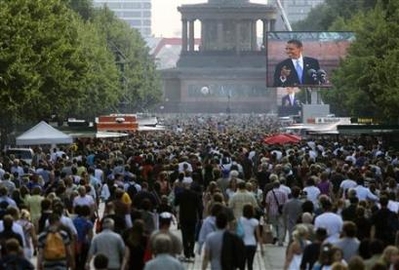
OBAMA SPEECH TRANSCRIPT:
Remarks of Senator Barack Obama (as prepared for delivery)
"A World that Stands as One"
July 24th, 2008
Berlin, Germany
Thank you to the citizens of Berlin and to the people of Germany. Let me thank Chancellor Merkel and Foreign Minister Steinmeier for welcoming me earlier today. Thank you Mayor Wowereit, the Berlin Senate, the police, and most of all thank you for this welcome.
I come to Berlin as so many of my countrymen have come before. Tonight, I speak to you not as a candidate for President, but as a citizen - a proud citizen of the United States, and a fellow citizen of the world.
I know that I don't look like the Americans who've previously spoken in this great city. The journey that led me here is improbable. My mother was born in the heartland of America, but my father grew up herding goats in Kenya. His father - my grandfather - was a cook, a domestic servant to the British.
At the height of the Cold War, my father decided, like so many others in the forgotten corners of the world, that his yearning - his dream - required the freedom and opportunity promised by the West. And so he wrote letter after letter to universities all across America until somebody, somewhere answered his prayer for a better life.
That is why I'm here. And you are here because you too know that yearning. This city, of all cities, knows the dream of freedom. And you know that the only reason we stand here tonight is because men and women from both of our nations came together to work, and struggle, and sacrifice for that better life.
Ours is a partnership that truly began sixty years ago this summer, on the day when the first American plane touched down at Templehof.
On that day, much of this continent still lay in ruin. The rubble of this city had yet to be built into a wall. The Soviet shadow had swept across Eastern Europe, while in the West, America, Britain, and France took stock of their losses, and pondered how the world might be remade.
This is where the two sides met. And on the twenty-fourth of June, 1948, the Communists chose to blockade the western part of the city. They cut off food and supplies to more than two million Germans in an effort to extinguish the last flame of freedom in Berlin.
The size of our forces was no match for the much larger Soviet Army. And yet retreat would have allowed Communism to march across Europe. Where the last war had ended, another World War could have easily begun. All that stood in the way was Berlin.
And that's when the airlift began - when the largest and most unlikely rescue in history brought food and hope to the people of this city.
The odds were stacked against success. In the winter, a heavy fog filled the sky above, and many planes were forced to turn back without dropping off the needed supplies. The streets where we stand were filled with hungry families who had no comfort from the cold.
But in the darkest hours, the people of Berlin kept the flame of hope burning. The people of Berlin refused to give up. And on one fall day, hundreds of thousands of Berliners came here, to the Tiergarten, and heard the city's mayor implore the world not to give up on freedom. "There is only one possibility," he said. "For us to stand together united until this battle is won...The people of Berlin have spoken. We have done our duty, and we will keep on doing our duty. People of the world: now do your duty...People of the world, look at Berlin!"
People of the world - look at Berlin!
Look at Berlin, where Germans and Americans learned to work together and trust each other less than three years after facing each other on the field of battle.
Look at Berlin, where the determination of a people met the generosity of the Marshall Plan and created a German miracle; where a victory over tyranny gave rise to NATO, the greatest alliance ever formed to defend our common security.
Look at Berlin, where the bullet holes in the buildings and the somber stones and pillars near the Brandenburg Gate insist that we never forget our common humanity.
People of the world - look at Berlin, where a wall came down, a continent came together, and history proved that there is no challenge too great for a world that stands as one.
Sixty years after the airlift, we are called upon again. History has led us to a new crossroad, with new promise and new peril. When you, the German people, tore down that wall - a wall that divided East and West; freedom and tyranny; fear and hope - walls came tumbling down around the world. From Kiev to Cape Town, prison camps were closed, and the doors of democracy were opened. Markets opened too, and the spread of information and technology reduced barriers to opportunity and prosperity. While the 20th century taught us that we share a common destiny, the 21st has revealed a world more intertwined than at any time in human history.
The fall of the Berlin Wall brought new hope. But that very closeness has given rise to new dangers - dangers that cannot be contained within the borders of a country or by the distance of an ocean.
The terrorists of September 11th plotted in Hamburg and trained in Kandahar and Karachi before killing thousands from all over the globe on American soil.
As we speak, cars in Boston and factories in Beijing are melting the ice caps in the Arctic, shrinking coastlines in the Atlantic, and bringing drought to farms from Kansas to Kenya.
Poorly secured nuclear material in the former Soviet Union, or secrets from a scientist in Pakistan could help build a bomb that detonates in Paris. The poppies in Afghanistan become the heroin in Berlin. The poverty and violence in Somalia breeds the terror of tomorrow. The genocide in Darfur shames the conscience of us all.
In this new world, such dangerous currents have swept along faster than our efforts to contain them. That is why we cannot afford to be divided. No one nation, no matter how large or powerful, can defeat such challenges alone. None of us can deny these threats, or escape responsibility in meeting them. Yet, in the absence of Soviet tanks and a terrible wall, it has become easy to forget this truth. And if we're honest with each other, we know that sometimes, on both sides of the Atlantic, we have drifted apart, and forgotten our shared destiny.
In Europe, the view that America is part of what has gone wrong in our world, rather than a force to help make it right, has become all too common. In America, there are voices that deride and deny the importance of Europe's role in our security and our future. Both views miss the truth - that Europeans today are bearing new burdens and taking more responsibility in critical parts of the world; and that just as American bases built in the last century still help to defend the security of this continent, so does our country still sacrifice greatly for freedom around the globe.
Yes, there have been differences between America and Europe. No doubt, there will be differences in the future. But the burdens of global citizenship continue to bind us together. A change of leadership in Washington will not lift this burden. In this new century, Americans and Europeans alike will be required to do more - not less. Partnership and cooperation among nations is not a choice; it is the one way, the only way, to protect our common security and advance our common humanity.
That is why the greatest danger of all is to allow new walls to divide us from one another.
The walls between old allies on either side of the Atlantic cannot stand. The walls between the countries with the most and those with the least cannot stand. The walls between races and tribes; natives and immigrants; Christian and Muslim and Jew cannot stand. These now are the walls we must tear down.
We know they have fallen before. After centuries of strife, the people of Europe have formed a Union of promise and prosperity. Here, at the base of a column built to mark victory in war, we meet in the center of a Europe at peace. Not only have walls come down in Berlin, but they have come down in Belfast, where Protestant and Catholic found a way to live together; in the Balkans, where our Atlantic alliance ended wars and brought savage war criminals to justice; and in South Africa, where the struggle of a courageous people defeated apartheid.
So history reminds us that walls can be torn down. But the task is never easy. True partnership and true progress requires constant work and sustained sacrifice. They require sharing the burdens of development and diplomacy; of progress and peace. They require allies who will listen to each other, learn from each other and, most of all, trust each other.
That is why America cannot turn inward. That is why Europe cannot turn inward. America has no better partner than Europe. Now is the time to build new bridges across the globe as strong as the one that bound us across the Atlantic. Now is the time to join together, through constant cooperation, strong institutions, shared sacrifice, and a global commitment to progress, to meet the challenges of the 21st century. It was this spirit that led airlift planes to appear in the sky above our heads, and people to assemble where we stand today. And this is the moment when our nations - and all nations - must summon that spirit anew.
This is the moment when we must defeat terror and dry up the well of extremism that supports it. This threat is real and we cannot shrink from our responsibility to combat it. If we could create NATO to face down the Soviet Union, we can join in a new and global partnership to dismantle the networks that have struck in Madrid and Amman; in London and Bali; in Washington and New York. If we could win a battle of ideas against the communists, we can stand with the vast majority of Muslims who reject the extremism that leads to hate instead of hope.
This is the moment when we must renew our resolve to rout the terrorists who threaten our security in Afghanistan, and the traffickers who sell drugs on your streets. No one welcomes war. I recognize the enormous difficulties in Afghanistan. But my country and yours have a stake in seeing that NATO's first mission beyond Europe's borders is a success. For the people of Afghanistan, and for our shared security, the work must be done. America cannot do this alone. The Afghan people need our troops and your troops; our support and your support to defeat the Taliban and al Qaeda, to develop their economy, and to help them rebuild their nation. We have too much at stake to turn back now.
This is the moment when we must renew the goal of a world without nuclear weapons. The two superpowers that faced each other across the wall of this city came too close too often to destroying all we have built and all that we love. With that wall gone, we need not stand idly by and watch the further spread of the deadly atom. It is time to secure all loose nuclear materials; to stop the spread of nuclear weapons; and to reduce the arsenals from another era. This is the moment to begin the work of seeking the peace of a world without nuclear weapons.
This is the moment when every nation in Europe must have the chance to choose its own tomorrow free from the shadows of yesterday. In this century, we need a strong European Union that deepens the security and prosperity of this continent, while extending a hand abroad. In this century - in this city of all cities - we must reject the Cold War mind-set of the past, and resolve to work with Russia when we can, to stand up for our values when we must, and to seek a partnership that extends across this entire continent.
This is the moment when we must build on the wealth that open markets have created, and share its benefits more equitably. Trade has been a cornerstone of our growth and global development. But we will not be able to sustain this growth if it favors the few, and not the many. Together, we must forge trade that truly rewards the work that creates wealth, with meaningful protections for our people and our planet. This is the moment for trade that is free and fair for all.
This is the moment we must help answer the call for a new dawn in the Middle East. My country must stand with yours and with Europe in sending a direct message to Iran that it must abandon its nuclear ambitions. We must support the Lebanese who have marched and bled for democracy, and the Israelis and Palestinians who seek a secure and lasting peace. And despite past differences, this is the moment when the world should support the millions of Iraqis who seek to rebuild their lives, even as we pass responsibility to the Iraqi government and finally bring this war to a close.
This is the moment when we must come together to save this planet. Let us resolve that we will not leave our children a world where the oceans rise and famine spreads and terrible storms devastate our lands. Let us resolve that all nations - including my own - will act with the same seriousness of purpose as has your nation, and reduce the carbon we send into our atmosphere. This is the moment to give our children back their future. This is the moment to stand as one.
And this is the moment when we must give hope to those left behind in a globalized world. We must remember that the Cold War born in this city was not a battle for land or treasure. Sixty years ago, the planes that flew over Berlin did not drop bombs; instead they delivered food, and coal, and candy to grateful children. And in that show of solidarity, those pilots won more than a military victory. They won hearts and minds; love and loyalty and trust - not just from the people in this city, but from all those who heard the story of what they did here.
Now the world will watch and remember what we do here - what we do with this moment. Will we extend our hand to the people in the forgotten corners of this world who yearn for lives marked by dignity and opportunity; by security and justice? Will we lift the child in Bangladesh from poverty, shelter the refugee in Chad, and banish the scourge of AIDS in our time?
Will we stand for the human rights of the dissident in Burma, the blogger in Iran, or the voter in Zimbabwe? Will we give meaning to the words "never again" in Darfur?
Will we acknowledge that there is no more powerful example than the one each of our nations projects to the world? Will we reject torture and stand for the rule of law? Will we welcome immigrants from different lands, and shun discrimination against those who don't look like us or worship like we do, and keep the promise of equality and opportunity for all of our people?
People of Berlin - people of the world - this is our moment. This is our time.
I know my country has not perfected itself. At times, we've struggled to keep the promise of liberty and equality for all of our people. We've made our share of mistakes, and there are times when our actions around the world have not lived up to our best intentions.
But I also know how much I love America. I know that for more than two centuries, we have strived - at great cost and great sacrifice - to form a more perfect union; to seek, with other nations, a more hopeful world. Our allegiance has never been to any particular tribe or kingdom - indeed, every language is spoken in our country; every culture has left its imprint on ours; every point of view is expressed in our public squares. What has always united us - what has always driven our people; what drew my father to America's shores - is a set of ideals that speak to aspirations shared by all people: that we can live free from fear and free from want; that we can speak our minds and assemble with whomever we choose and worship as we please.
These are the aspirations that joined the fates of all nations in this city. These aspirations are bigger than anything that drives us apart. It is because of these aspirations that the airlift began. It is because of these aspirations that all free people - everywhere - became citizens of Berlin. It is in pursuit of these aspirations that a new generation - our generation - must make our mark on the world.
People of Berlin - and people of the world - the scale of our challenge is great. The road ahead will be long. But I come before you to say that we are heirs to a struggle for freedom. We are a people of improbable hope. With an eye toward the future, with resolve in our hearts, let us remember this history, and answer our destiny, and remake the world once again.
Original here
 as waitresses, bartenders, retail clerks and hospital orderlies.
as waitresses, bartenders, retail clerks and hospital orderlies.![[Al Gore's Doomsday Clock]](http://s.wsj.net/public/resources/images/OB-BW643_oj_glo_20080721184941.jpg)











